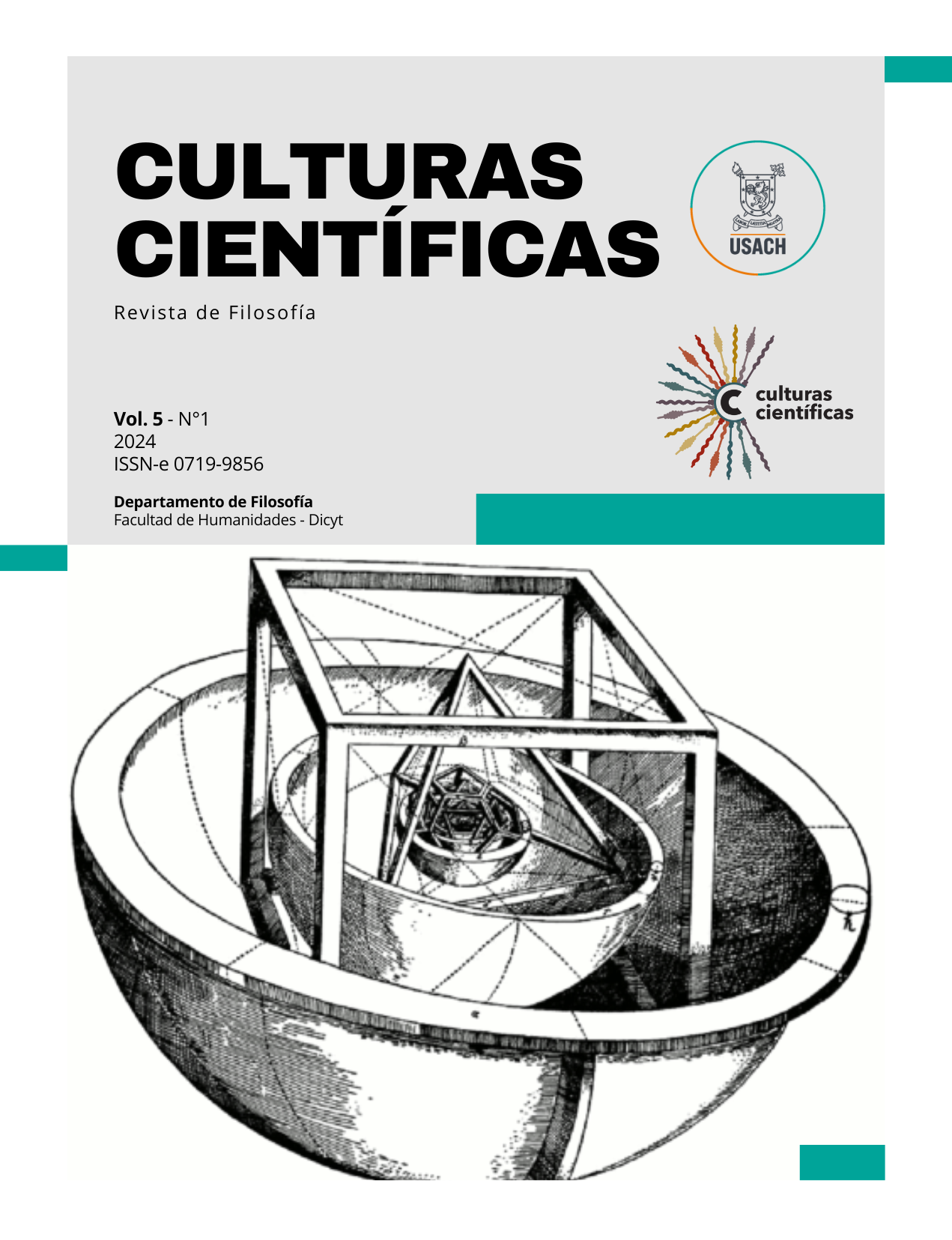Valores Extra Epistémicos en las Ciencias ¿Es posible sostener hoy en día el ideal de la ciencia libre de valores?
DOI:
https://doi.org/10.35588/cc.v5i1.6410Palabras clave:
valores extra epistémicos, pluralismo científico, ideal de la ciencia libre de valores, riesgo inductivo, salto inductivoResumen
El presente trabajo aborda el ideal de la ciencia libre de valores extra epistémicos. Al respecto, se sitúa la discusión en el marco de autores que adscriben al denominado pluralismo científico, quienes, por lo general, tienen una postura más proclive a aceptar la influencia de valores extra epistémicos en las ciencias, tales como valores morales, políticos y sociales. En particular, se somete a revisión la postura de Helen Lóngino, Heather Douglas y John Dupré, analizando si le son o no aplicables las críticas desarrolladas fundamentalmente por Hugh Lacey, quien, siendo pluralista, sigue sosteniendo el ideal de la ciencia libre de valores. Se concluye que existen buenos argumentos que apoyan la influencia de valores extra epistémicos en las ciencias; sin embargo, su extensión puede ser objeto de debate o bien matizada. Al respecto, se toma posición por la postura de John Dupré, la cual reconoce que en ciertos ámbitos de las ciencias–como la física de partículas- no existe una carga extra epistémica. Asimismo, se concluye que, aunque el ideal de una ciencia completamente libre de valores debe ser rechazado, puede tener alguna relevancia en tanto ideal regulativo, imponiendo esta versión un mayor desafío para las posturas que procuran refutar el ideal en cuestión.
Descargas
Referencias
Ayer, A. J. (1936/1971). Language, truth and logic. London: Penguin.
Anderson, E. (1995). Feminist Epistemology: And Interpretation and a Defense. Hypatia, Summer, 1995, Vol. 10, No. 3, Analytic Feminism (Summer, 1995); pp. 50-84. https://doi.org/10.1111/j.1527-2001.1995.tb00737.x
Aldunate, M. (2021). Informe técnico: seguridad de la vacuna sars-cov-2 Coronoavac e hidróxido de aluminio en personas menores de 18 años. Santiago: Instituto de Salud Pública, Ministerio de Salud, Gobierno de Chile. Disponible en línea: https://www.ispch.cl/wp-content/uploads/2021/09/INFORME-T%C3%89CNICO-SEGURIDAD-DE-LA-VACUNA-SARS-COV-2-CORONAVAC-E-HIDR%C3%93XIDO-DE-ALUMINIO-EN-PERSONAS-MENORES-DE-18-A%C3%91OS.pdf [Consultado con fecha 20-12-2024]
Bacon, F. (1620/2003). The New Organon. Cambridge University Press.
Betz, G. (2017): Why the Argument from Inductive Risk Doesn’t Justify Incorporating Non-Epistemic Values in Scientific Reasoning. En En Elliot, Kevin C.; Steel, Daniel (ed.): Current Controversies in Values and Science. Routledge, pp. 64-78. https://doi.org/10.4324/9781315639420
Brown, Matthew J. (2017). Against Epistemic Priority. En Elliot, Kevin C.; Steel, Daniel (ed.): Current Controversies in Values and Science. Routledge, pp. 64-78. https://doi.org/10.4324/9781315639420
Chang, Hasok (2012). Is Water H20? Evidence, Realism and Pluralism. Springer.
Chang, Hasok (2022). REALISM FOR REALISTIC PEOPLE. A New Pragmatist Philosophy of Science. Cambridge University Press. https://doi.org/10.1017/9781108635738
Douglas, H. (2009). Science, policy, and the value-free ideal. University of Pittsburgh Press. https://doi.org/10.2307/j.ctt6wrc78
Dupré, J. (1993). The Disorder of Things. Metaphysical Foundations of the Disunity of Science. Harvard University Press.
Feyerabend, P. (1975). Against method: Outline of an anarchistic theory of knowledge. Verso Books.
Gómez, Ricardo J (2014). La dimensión valorativa de las ciencias: hacia una filosofía política. Universidad Nacional de Quilmes.
Galilei, G. (1623/1957). Galilei, G. (1957). Discoveries and opinions of Galileo: Including The starry messenger (1610), Letter to the Grand Duchess Christina (1615), and excerpts from Letters on sunspots (1613), The assayer (1623) (S. Drake, Trad. y Ed.). Anchor Books.
Hume, D. (1740/1984). Tratado de la naturaleza humana. Ediciones Orbis.
Kincaid, Harold; Dupré, John & Wylie, Alison (Eds.) (2007). Value-Free Science? Ideals and Illusions. Oxford University Press. https://doi.org/10.1093/acprof:oso/9780195308969.001.0001
Kellert, S.; Longino, H; and Waters, K. (ed.) (2006). Scientific Pluralism. University of Minnesota Press.
Kitcher, P. (2001). Science, Truth, and Democracy. Oxford University Press. https://doi.org/10.1093/0195145836.001.0001
Longino, H. (1990). Science as Social Knowledge. Princeton University Press. https://doi.org/10.2307/j.ctvx5wbfz
Lacey, H. (2017). Distinguishing Between Cognitive and Social Values. En Elliot, Kevin C.; Steel, Daniel (ed.): Current Controversies in Values and Science. Routledge, pp. 64-78. https://doi.org/10.4324/9781315639420
Lacey, H. (1999). Is science value free? Values and scientific understanding. Routledge.
Lacey, H. (2005). Values and Objectivity in Science: The Current Controversy about Transgenic Crops. Lexington Books.
Olivares Díaz, Paulo (2023). Conclusiones Indeseables en las Ciencias: Una Perspectiva Pluralista. En Revista Culturas Científicas. Vol.4, N°1, Pág. 18-34. https://doi.org/10.35588/cc.v4i1.5995
Putnam, H. (1975). Mathematics, Matter and Method: Philosophical Papers, Volume 1. https://doi.org/10.1086/288790
Putnam, H. (2002). The collapse of value/fact dichotomy and other essays. Harvard University Press.
Popper, K. R. (1934/1980). La lógica de la investigación científica. Editorial Tecnos.
Poincaré, H. (1920/1958). The Value of Science. Dover.
Quine, W.V. (1951). Two Dogmas of Empiricism. En The Philosophical Review, Vol. 60, No. 1. (Jan., 1951), pp. 20-43.
Sharlin, A. N. (1974). “Max Weber and the origins of the Idea of Value-Free Social Science”. En European Journal of Sociology / Archives Européennes de Sociologie / Europäisches Archiv für Soziologie, 1974, Vol. 15, No. 2, Citoyens armés, prétoriens désarmés (1974), pp. 337-353.
Kuhn, T. S. (1962). The structure of scientific revolutions. University of Chicago Press.
Reichenbach, H. (1938). Experience and prediction: An analysis of the foundations and the structure of knowledge. University of Chicago Press. https://doi.org/10.1037/11656-000
Rooney, P. (2017): “The Borderlands Between Epistemic and Non-Epistemic Values”. En Elliot, Kevin C.; and Steel, Daniel (ed.), Current Controversies in Values and Science. Routledge, pp. 31-45. https://doi.org/10.4324/9781315639420
Thonemann, Philip (2020). Ideally Value-Free Coronavirus Science. Disponible en línea https://www.lse.ac.uk/philosophy/blog/2020/09/09/ideally-value-free-coronavirus-science/ [Consultado con fecha 20-12-2024]
Weber, M. (1913/1999). “Value-judgments in Social Science”. En Boyd, Richard; Gasper, Philip; and Trout, J.D. (ed.), The Philosophy of Science. Séptima edición. The MIT Press.
Descargas
Enviado
2023-10-24Publicado
Versiones
- 2025-01-17 (2)
- 2024-12-26 (1)
Número
Sección
Licencia
Derechos de autor 2024 Paulo Javier Olivares Díaz

Esta obra está bajo una licencia internacional Creative Commons Atribución 4.0.











